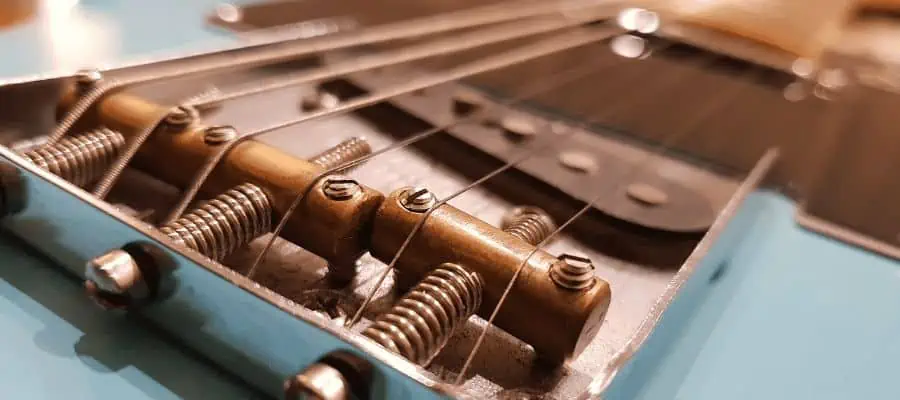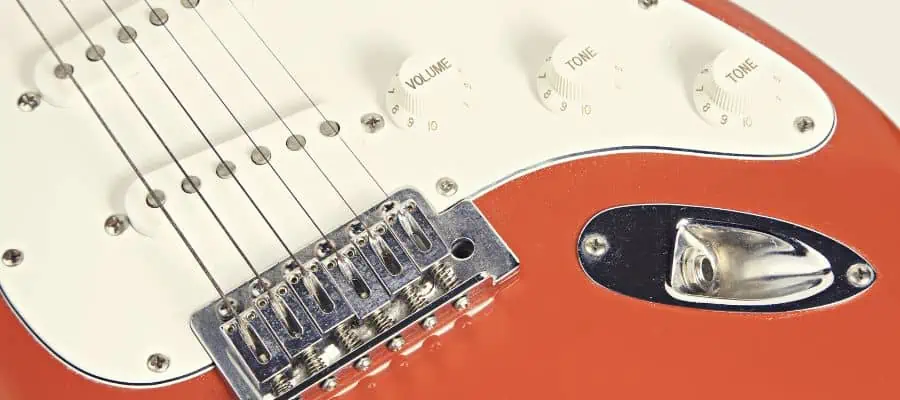It’s important to note that while guitar strings, particularly those made of steel, may have a slight metallic scent when closely inspected, if the smell is strong enough to be noticed without prompting, there may be an underlying problem. It’s worth noting that high-quality strings should not have any smell at all. So, if you’re wondering why your guitar strings have a metallic smell, it’s worth investigating further.
Metal strings usually smell like metal because they’re rusting. When residue builds up, it’ll penetrate the strings and affect their structural integrity, which is why a strong metallic scent is a warning sign. Strong chemicals and environmental causes can also affect the smell.
When you start to feel that metal smell, it most probably means the time for restringing has arrived. So, check your strings for corrosion and prepare to change the strings if you feel it is necessary.
Why Metallic Smell Is Coming Off of Your Guitar Strings

Though corrosion is the main cause of the metallic smell coming from your strings, several factors can contribute to its presence or potency. Before I explore these potential causes, though, I want to make a small disclaimer.
It’s perfectly normal for strings to have a slight metallic smell when they’re new or freshly replaced. After all, guitar strings are traditionally made from metal alloys, including, but not limited to:
- Steel
- Bronze
- Nickel
- Metal-silk hybrids
However, if the scent is too strong or persists even after repeated use, you might have an underlying issue that must be addressed. Here are some of the most common causes to beware of:
Corrosion
An overpowering metallic smell indicates that corrosion has begun to occur. Corrosion occurs when the metal in the guitar strings reacts to moisture, oils, or sweat, causing them to rust and deteriorate.
Once corrosion sets in, the structural integrity of the strings will be weakened, and the sound quality will deteriorate with every passing day. Eventually, you will have no choice but to replace the strings. However, if you feel that the problem is not too severe, you can prevent further corrosion by learning the tips on preventing corrosion in guitar strings in the section below.
Chemicals
Sometimes, when certain chemicals or manufacturing processes are used to create or keep guitar strings, a metallic odor may follow. However, if this happens, it should be a one-time occurrence if you purchase strings from a particular brand or have them serviced by a particular technician.
Moreover, if the issue lies in the cleaning solutions, the smell should subside after the first few uses.
Poor Hygiene
It’s crucial to wash your hands before every playing session and wipe the strings afterward to avoid the accumulation of oil, sweat, and grime from your fingers. Not doing so may speed up corrosion and release a metallic smell.
Therefore, practicing good hygiene is essential for both your hands and the instrument itself if you want to keep your strings strong and corrosion-free for an extended period.
Environmental Factors
Where you play or store your guitar can also significantly impact the smell it gives off. For example, if you store your guitar in a damp basement or garage, the strings are bound to start experiencing some corrosion. The same goes for those who play frequent, long sessions outdoors in humid conditions.
If you suspect your guitar strings are corroded or giving off an uncharacteristically strong metallic odor, it might be best to replace them altogether. Insisting on using decaying strings can only lead to more issues, not only with your sound but also with the guitar itself.
However, if you are uncomfortable making that decision, contact a professional for their opinion. Still, if the strings get smelly, they’re likely due for a replacement anyway.
How To Prevent Corrosion in Guitar Strings

Luckily, there are some steps you can take to prevent guitar string corrosion (and the metallic smell that comes with it). Here are just a few examples of what you can do:
- Always wash your hands before playing. Oil and sweat from your fingers will only accelerate corrosion and create unpleasant smells. So, even though it might feel a bit tedious, make hand-washing part of your playing ritual.
- Wipe the strings clean after playing. Even the most thorough wash job won’t limit oil and residue from coming in contact with the strings altogether. So, always wipe the strings after each session with a clean, dry cloth.
- Use coated strings. These are designed to withstand the grime, oil, and impurities they come in contact with. So, these are your best bet if you’re looking for something corrosion-proof (or as close to corrosion-proof as possible).
- Store your guitar properly. Keeping your guitar in a dry, cool space can help prevent corrosion and its subsequent metallic smell. If you don’t have room or practice space that fits the bill, you can always invest in a humidifier and temperature control system to keep external conditions ideal.
- Change your strings regularly. Even the best-quality strings will start rusting and wearing down once their time comes. So, though the process can be time and resource-consuming, try your best not to fall behind on your string replacement schedule.
As long as you practice these tips, you won’t help prevent corrosion and its subsequent metallic smell, but you’ll also optimize the performance and lifespan of your guitar.
Conclusion
The main reason guitar strings give off a metallic smell is corrosion. That’s why, as soon as you notice this type of scent while playing, you’ll want to get to the bottom of the problem and replace the strings if necessary.
The only exception to this rule is if you’ve just gotten your strings, in which case, a slight metal smell is to be expected. However, if it persists, corrosion, harsh chemicals, poor hygiene, and environmental factors can all be to blame. Luckily, following the steps outlined above, you can keep your guitar odor-free.
If you found this article useful, you may want to save this pin below to your Guitar board.

Recent Posts
When learning new songs have you noticed that some of the chord sequences sound really good? But when you tried to come up with your own chord sequence, or as we call it chord progression, you found...
Some guitarists insist on buying an expensive amplifier with their electric guitar. They assume that this is a must for every type of guitarist out there. However, in some situations, this isn’t...

